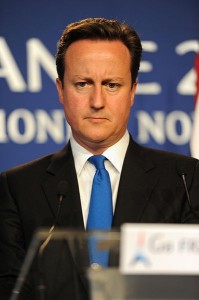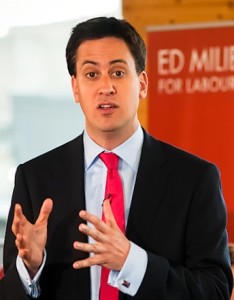 Looking ahead to what 2014 holds in store for Britain’s main political parties, Eunice Goes writes that this year will test David Cameron’s leadership skills to the limit with the European parliament elections, the Scottish referendum, and potential interest rate hikes by the Bank of England looming. On the other hand, she predicts life will not be much easier for the leader of the Labour Party, Ed Miliband, whose leadership rating is abysmal. The LibDems face the difficult task of distancing themselves from the Conservatives and regaining the support they’ve lost while in government.
Looking ahead to what 2014 holds in store for Britain’s main political parties, Eunice Goes writes that this year will test David Cameron’s leadership skills to the limit with the European parliament elections, the Scottish referendum, and potential interest rate hikes by the Bank of England looming. On the other hand, she predicts life will not be much easier for the leader of the Labour Party, Ed Miliband, whose leadership rating is abysmal. The LibDems face the difficult task of distancing themselves from the Conservatives and regaining the support they’ve lost while in government.
As the dry and sad Christmas trees pile on the pavements together with the empty champagne bottles and the past-their-sell-by-date canapés, Britain’s party leaders must start preparing for another party that will also involve absurd levels of spending. That ‘party’ is, of course, the 2015 general elections.
With the opinion polls indicating an open contest and the increasing likelihood of a hung parliament, the three main parties cannot afford mistakes or careless actions, so they started 2014 with only one thought in their minds: ensuring that the next 16 months will lead to a parliamentary majority (or in the case of the Liberal-Democrats obtaining the best possible result). For that to be an achievable aim, the three main parties will need to plan with military precision for three momentous events, namely the elections to the European parliament scheduled for May, the referendum on Scottish independence in September, and the moment when the Bank of England will raise interest rates. They will need as well to demonstrate a canning ability to survive those unexpected events that can throw off track the most skillful politician.

This year will be particularly difficult for the prime minister, David Cameron. After all, as the occupier of Number 10 he is the one with more to lose. The first big test of the year he will face will be the elections to the European Parliament, scheduled for May. In these elections, the United Kingdom Independence Party (UKIP) is expected to become the most voted party. Indeed, UKIP’s surge will be the great political event of 2014 and though it is still unclear if its effect will persist until 2015, the Conservative Party is panicking. As some MPs fear to lose their seats to UKIP candidates, many are putting pressure on the prime minister to shift further to the right and deliver more anti-immigration and anti-EU policies.
In particular, the prime minister will face renewed demands from the Eurosceptic wing of his party to hold an in-out referendum on EU membership before the general elections and to demand the impossible from the European Union. He will resist the pressure, but the constant nagging and the media focus on the euro-obsession of Conservative MPs will damage the party’s standing in the polls. Indeed, moderate conservatives are increasingly worried with the current direction of the party. Some, like Ryan Shorthouse from the conservative think-tank Bright Blue even say that, you can’t govern by ‘clampdown’ and you can’t inspire by ‘messaging [that] is quite negative and uninspiring’.
The referendum on Scottish independence will be another big test for the Prime Minister. If it is true that successive opinion polls suggest that the ‘No’ side will win, the Scottish nationalists have a sufficiently positive message and an effective campaign to cause some nervousness in Number 10. And though it is unlikely that Cameron will be the prime minister who will break the union, the Scottish referendum will unleash a debate on constitutional reform (and in particular on federalism) for which the Conservative Party has no appetite or inclination.
The third big challenge facing David Cameron is of course the economy. Though the macroeconomic figures signal the return of economic growth and a declining unemployment rate, the recovery is mostly based on consumer spending and rising levels of private debt (the ingredients that caused the financial crisis of 2008). Moreover, the public deficit remains stubbornly high at 6.8%. But more importantly, most Britons have yet not felt the signs of the recovery. Since the start of the financial crisis most workers saw their incomes decline as a result of pay freezes and rising living costs. The Tory high-command recognises this threat and it is very likely that the Chancellor of the Exchequer, George Osborne will use this year’s budget to spread some goodwill in the shape of tax cuts.
However, there is a potentially damaging factor Osborne does not control. If, as some expect, the Bank of England raises interest rates in 2014, the crisis of living costs will become more acute to home-owners, with many expected to default on their mortgage payments. If this scenario materialises, it will be very difficult for the Conservatives to win a majority in 2015.

If this year will test Cameron’s leadership skills to the limit, life will not be much easier for the leader of the Labour Party, Ed Miliband. Having managed to finally gain control of his party and to set the political agenda with his focus on the ‘cost of living crisis’, Miliband is now under pressure to deliver a fuller and more ambitious political agenda that goes beyond promising lower energy bills and regulating the ‘Wonga economy’. But this will be problematic as Miliband is equally under pressure to propose a ‘realistic’ programme of government (i.e. low on public spending promises and strong on fiscal responsibility).
Above all, Miliband is under pressure to consolidate Labour’s poll lead and to improve his personal ratings. As John Curtice reminded us, Edward Heath was the only leader of the opposition with equally poor personal ratings but who managed to make it to number 10. If Miliband wants to repeat Ted Heath’s feat he has to make a concerted effort to dominate the political agenda throughout 2014 with concrete policy proposals associated to an inspirational narrative and a strategy of high-media visibility. The Labour leader will have as well to accept a higher level of personal exposure (that he has avoided so far) if he wants to become prime minister.
The only consolation for Miliband is that the leader of the Liberal-Democrats, Nick Clegg has almost as bad personal ratings (according to MORI’s poll in December 2013, Clegg’s personal ratings stand at -29 whereas Miliband stands at -25) as himself. Since the Liberal Democrats formed a coalition government with the Conservatives their popularity has been in a freefall. Indeed, some pollsters go as far as predicting that in 2015 the Liberal Democrats will only win 24 seats.
This prediction is consistent with several opinion polls and reflects the fact that many Lib-Dem voters have shifted to Labour since 2010 however it underestimates the party’s ability to retain seats. Moreover, it is also likely that Labour’s slight shift to the left and the Conservatives’ shift to the right will benefit the Liberal Democrats as they can present themselves as the only genuine centrist party in Britain.
But in order to be seen as a centrist party, the Liberal-Democrats will have to start to distance themselves from the Conservatives. Nick Clegg has already indicated that his strategy for 2015 will be focussed on occupying the centre ground on the economy, the environment, Europe and immigration. This strategy will allow the Liberal-Democrats to create sufficient distance from both Labour and the Conservatives opening the possibility of coalition talks with either of them.
In short, the uncertainty about the economy, the realities of multiparty politics where the two main parties can no longer count on winning majorities, and where other small parties compete for attention, the volatility of voter behaviour means that this year will be marked by nervousness and tension as every test – no matter how insignificant – will be taken to be decisive for the outcome 2015 general elections. For all these reasons, 2014 will be the year of living nervously.
Note: This article gives the views of the author, and not the position of the British Politics and Policy blog, nor of the London School of Economics. Please read our comments policy before posting.
About the Author
 Dr. Eunice Goes is an Associate Professor at Richmond University. Her research looks at political parties and ideologies and she is writing a book on the Labour Party under Ed Miliband. Contact: eunice.goes@richmond.ac.uk
Dr. Eunice Goes is an Associate Professor at Richmond University. Her research looks at political parties and ideologies and she is writing a book on the Labour Party under Ed Miliband. Contact: eunice.goes@richmond.ac.uk







Headline about the parties: article about the leaders. Trotsky’s words comes to mind.
However, I expect Cameron to be most nervous as he is on the way down. His party is splitting at the base by block caps UKIP, EU and HS2.
Miliband is doing fine. As a party member I see signs of moving the debate towards wealth creation and investment by government which will be popular as it means an integrated emphasis upon job creation, skills provision and manufacturing. Promoting them as separate items has always had a kinda stoopid feel to it.
Clegg is moving from moderator of the cut-mad Tories to moderator of spendthrift Labour, offering the country a Lib-Lab coalition which will do him a world of good in his Lib-Lab and Lib-Con marginals. He knows his Borgen.
None of the above thanks. Government by vested interest? No thanks, we need a green government for the people and planet, not these interchangeable plutocrats.